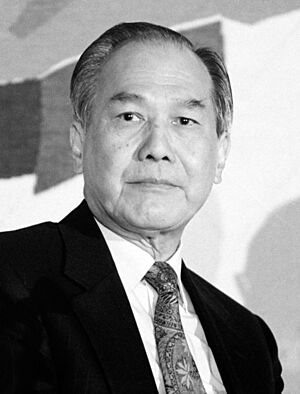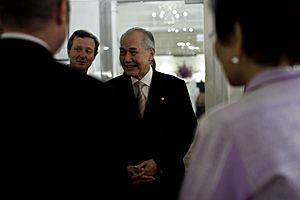Anand Panyarachun facts for kids
Quick facts for kids
Anand Panyarachun
MPCh MWM TChW
|
|
|---|---|
|
อานันท์ ปันยารชุน
|
|

Anand in 1995
|
|
| 18th Prime Minister of Thailand | |
| In office 10 June 1992 – 22 September 1992 |
|
| Monarch | Bhumibol Adulyadej |
| Preceded by | Meechai Ruchuphan (acting) |
| Succeeded by | Chuan Leekpai |
| In office 2 March 1991 – 23 March 1992 |
|
| Monarch | Bhumibol Adulyadej |
| Preceded by | Sunthorn Kongsompong (as Head of the National Peacekeeping Council) |
| Succeeded by | Suchinda Kraprayoon |
| Permanent Secretary for Foreign Affairs | |
| In office 12 August 1975 – 11 March 1977 |
|
| Minister | Chatichai Choonhavan Bhichai Rattakul Upadit Pachariyangkun |
| Preceded by | Phan Wannamethee |
| Succeeded by | Wong Phonnikon |
| Ambassador of Thailand | |
| In office to West Germany 1979 – 1984 to the United States 1972 – 1976 to Canada 1967 – 1972 to the United Nations 1964 – 1976 |
|
| Personal details | |
| Born | 9 August 1932 Bangkok, Krung Thep, Siam (now Bangkok, Thailand) |
| Spouse | M.R. Sodsri Panyarachun (née Chakrabandhu) (d. 2023) |
| Education | Dulwich College |
| Alma mater | Trinity College, Cambridge |
| Profession | Diplomat |
| Signature | |
Anand Panyarachun (born August 9, 1932) is a Thai retired politician. He served as the Prime Minister of Thailand two times. His first term was from 1991 to 1992, and his second was for a short time later in 1992. He helped start important changes in Thailand's economy and government. One big change was helping to write Thailand's "People's Constitution" in 1997. He received an award called the Ramon Magsaysay Award in 1997 for his work in government.
Contents
Early Life and Career
Anand Panyarachun was the youngest of twelve children. His family was wealthy and had a mix of Mon and Thai-Chinese heritage. His father studied in England and later became a successful businessman. Anand went to Dulwich College in England. He then studied law at Trinity College, Cambridge, and graduated in 1955.
Anand worked in foreign service for 23 years. He was Thailand's Ambassador to the United Nations, Canada, the United States, and West Germany. In 1976, he became the top official in the foreign ministry. He helped make sure the US military left Thailand. After a military takeover that year, some people wrongly accused him of being a communist. Even though he was cleared, he left government work in 1979. He then joined a private company, Saha-Union Group, and became its chairman in 1991. He also became a director at Siam Commercial Bank in 1984.
First Time as Prime Minister (1991-1992)
On February 23, 1991, military leaders took control of the government. They removed the elected leader, Chatichai Choonhavan. The military group, called the National Peace Keeping Council (NPKC), chose Anand to be the temporary prime minister. They picked him because he was respected by many people and seen as honest.
Anand quickly said he would act independently and not just follow the military's orders. He chose a cabinet (his team of ministers) made up of smart experts and former government officials. Many people thought this was a very good team for Thailand.
Important Changes and Reforms
Anand's government worked hard to make many needed changes. They focused on improving education, public health, exports, farming, and living conditions. These efforts were very popular.
One of the most important changes was to the tax system. They introduced a new tax called value added tax (VAT). They also made it easier for money to move in and out of the country. For example, Thai people could invest abroad more easily. It also became simpler for foreign banks to open branches. Rules for getting factory licenses were also made much easier.
The government also worked on big projects to improve Thailand's infrastructure, like roads and railways. They set up a special group to watch over these projects. This was to help prevent corruption. To help ordinary people, government workers and state employees received higher wages. The minimum wage was also increased.
Key things Anand's first government achieved include:
- Helping to create the ASEAN Free Trade Area (AFTA). This made trade easier between countries in Southeast Asia.
- Starting a very effective plan to fight AIDS/HIV.
- Making changes to how electricity was managed.
- Giving a large contract to Telecom Asia (now True) to build many new telephone lines in Bangkok.
- Stopping a large rail-train project called Hopewell.
Foreign Relations
Anand's government also did well in dealing with other countries. Even though there was a military takeover, other countries quickly started working with Thailand again. Anand visited China, Japan, and the United States. He showed that his government wanted to make business easier and create a good environment for free trade.
Thailand's relationships with its neighbors also improved. Relations with Laos got much better. Thailand also played a big part in helping with the peace process in Cambodia.
Disagreements with the Military
Anand did not always agree with the military leaders. He disagreed with their plans to spend more money on defense. He believed that a country's security came from its economic and political strength, not just its military. He also disagreed with parts of the new constitution the military was writing. He wanted the appointed Senate to have less power, but the military did not accept his ideas.
Human Rights Concerns
During this time, Anand's government did not fully address human rights issues. The military controlled the media, and any criticism of them was not allowed. News about protests was often kept from the public. There were also concerns about villagers being moved from their homes and an activist monk facing difficulties. A labor leader also mysteriously disappeared.
Anand was later replaced by General Suchinda Kraprayoon, who was chosen by parliament after elections.
Second Time as Prime Minister (1992)
General Suchinda resigned on May 24, 1992, after large protests against his government. The king stepped in to help end the violence. The political parties that supported Suchinda tried to stay in power. However, the House Speaker, after meeting with a royal advisor, decided to recommend Anand Panyarachun again.
On June 10, 1992, Anand was chosen to be prime minister for a second time. This news was welcomed by most people. Anand quickly formed his new cabinet, again choosing many respected experts. His main goals were to fix the economy, hold fair elections, and remove some top military commanders from their positions.
He removed a law that allowed the military to use force against protesters. He also removed several high-ranking military leaders from their posts. Anand was later replaced by Chuan Leekpai, who was democratically elected.
After Being Prime Minister
After his time as prime minister, Anand went back to the Saha-Union Group as chairman. He left the company in 2002.
Helping to Write the "People's Constitution"
In 1996, Anand was chosen to be part of the group that wrote a new constitution for Thailand. He led the committee that drafted what became known as the "People's Constitution" of 1997. This constitution brought in several important changes:
- It gave more power to local governments.
- It created new independent government groups, like the Election Commission.
- It required candidates for parliament to have at least a bachelor's degree.
- It aimed to make the government more stable by favoring larger political parties.
This constitution was later removed in 2006 after another military takeover.
National Reconciliation Commission
From 2005, Anand led the National Reconciliation Commission (NRC). This group was tasked with helping to bring peace to the southern parts of Thailand, where there had been conflict. Anand often criticized the government's approach to the unrest. The NRC made recommendations, including using Islamic law and making the local Pattani-Malay language official in the region. However, these recommendations were not accepted by some high-ranking officials.
Other Important Roles
Anand has also held other important international roles. He is a member of the Trilateral Commission and an advisor for American International Group (AIG). He has been a UNICEF Ambassador for Thailand since 1996. From 2003 to 2004, the United Nations Secretary-General asked Anand to lead a special group. This group was tasked with suggesting ways to improve the UN.
Support for the 2006 Military Takeover
Anand supported the military takeover in 2006. This event removed the "People's Constitution" and the government of Thaksin Shinawatra. Anand had been a strong critic of Thaksin for several years. He believed that Thaksin's actions led to the military takeover. He also thought that the takeover was well-received by the people of Thailand.
Awards and Honors
Anand has received many awards and honors from Thailand and other countries.
Thai Honors
- 1991 -
 Knight Grand Cordon (Special Class) of the Most Exalted Order of the White Elephant
Knight Grand Cordon (Special Class) of the Most Exalted Order of the White Elephant - 1988 -
 Knight Grand Cordon (Special Class) of The Most Noble Order of the Crown of Thailand
Knight Grand Cordon (Special Class) of The Most Noble Order of the Crown of Thailand - 2003 -
 Knight Grand Cross (First Class) of the Most Admirable Order of the Direkgunabhorn
Knight Grand Cross (First Class) of the Most Admirable Order of the Direkgunabhorn - 1991 -
 Knight Grand Commander (Second Class, higher grade) of the Most Illustrious Order of Chula Chom Klao
Knight Grand Commander (Second Class, higher grade) of the Most Illustrious Order of Chula Chom Klao - 1967 -
 King Rama IX Royal Cypher Medal (Third Class)
King Rama IX Royal Cypher Medal (Third Class)
Foreign Honors
- 1961 -
 Commander of the Order of Merit of the Italian Republic (Third Class), Italy
Commander of the Order of Merit of the Italian Republic (Third Class), Italy - 1970 -
 Order of Diplomatic Service Merit Grand Gwanghwa Medal (First Class), Republic of Korea
Order of Diplomatic Service Merit Grand Gwanghwa Medal (First Class), Republic of Korea - 1971 -
 Star of Merit 1st Class, Indonesia
Star of Merit 1st Class, Indonesia - 1990 -
 Grand Officer of the Order of the Crown (Second Class), Belgium
Grand Officer of the Order of the Crown (Second Class), Belgium - 1991 -
 Grand Cordon of the Order of the Rising Sun, Japan
Grand Cordon of the Order of the Rising Sun, Japan - 1996 -
 Honorary Knight Commander of the Civil Division of the Most Excellent Order of the British Empire (KBE), United Kingdom
Honorary Knight Commander of the Civil Division of the Most Excellent Order of the British Empire (KBE), United Kingdom - 2007 -
 Commander Grand Cross of the Royal Order of the Polar Star, Sweden
Commander Grand Cross of the Royal Order of the Polar Star, Sweden
See also
 In Spanish: Anand Panyarachun para niños
In Spanish: Anand Panyarachun para niños
- List of prime ministers of Thailand
- Constitution of Thailand


